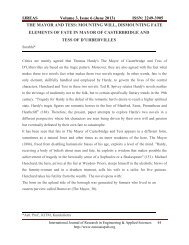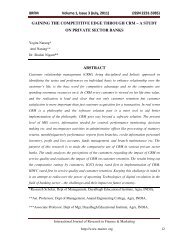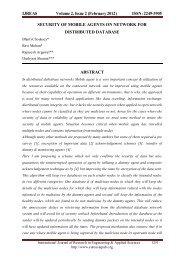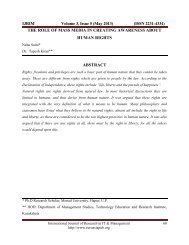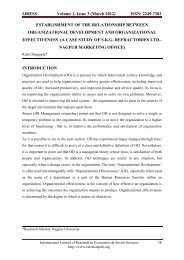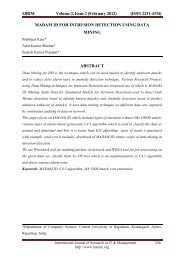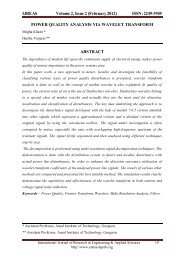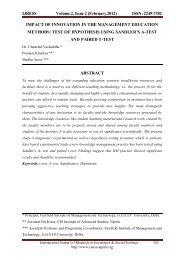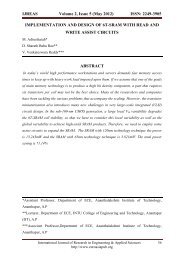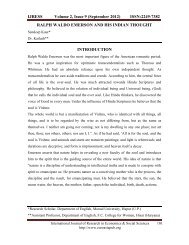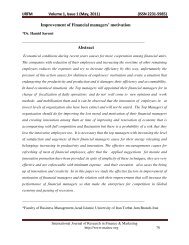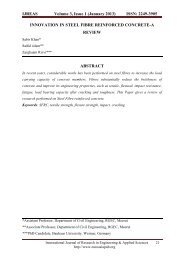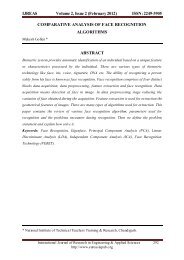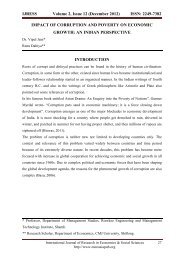shakespeare's sonnets - a critical analysis - Euroasiapub.org
shakespeare's sonnets - a critical analysis - Euroasiapub.org
shakespeare's sonnets - a critical analysis - Euroasiapub.org
You also want an ePaper? Increase the reach of your titles
YUMPU automatically turns print PDFs into web optimized ePapers that Google loves.
IJRESS Volume 2, Issue 9 (September 2012) ISSN: 2249-7382<br />
Sonnet 10's ultimate point, which is the theme Shakespeare's earlier <strong>sonnets</strong> in general, that the<br />
listener should bear children.<br />
Though, Shakespeare does not wish to back the listener in a corner. As it may be assumed the<br />
narrator is a husband, it is clear he does love the subject and wishes to communicate his concern<br />
without harming the subject. He says “Grant if thou wilt, thou art beloved of many,”, or that he<br />
knows the listener is loved by many people. Though, Sonnet 10 goes on to reinforce that this<br />
does not mean the listener has love for everyone else, “But that thou none love is most evident”.<br />
He goes on to say that the listener is in fact consumed by “hate” which he calls “murderous”. It is<br />
interesting to note that Shakespeare should use this diction. It's possible this is another act of<br />
foreshadowing to Sonnet 10's thesis and that Shakespeare refers to the listener ad such because<br />
he equates her unwillingness to have children to an act of murder. This becomes even more<br />
obvious when he writes that she is “Seeking that beauteous roof to ruin-ate” or for her house to<br />
fall apart because in Shakespeare's day, house was terminology for a family line.<br />
Towards the end of Sonnet 10, Shakespeare appeals to the listener to change her ways. He writes<br />
“O change thy thought, that I may change my mind.”, which is a direct request for the listener to<br />
reconsider her stance on child bearing so that Shakespeare may reconsider his feelings toward<br />
her character. When he asks “Shall hate be fairer lodged than gentle love” he is inquiring<br />
whether her unpleasantness should be more developed than her love, referring back to the<br />
metaphor that her house is crumbling when Shakespeare uses the word “lodged”. In attempting<br />
to change her mind, Shakespeare again flatters the subject of Sonnet 10, telling her to act as<br />
beautiful as she appears physically, “Be as thy presence is, gracious and kind,” or at least to<br />
herself; “Or to thyself at least kind-hearted prove.”<br />
The closing couplet embodies the melancholy of Sonnet 10's narrator and finally directly<br />
addresses his motivation for speaking. He asks “Make thee another self for love of me,”, which<br />
is ambiguous with two equally valid and implied interpretations. First, the Sonnet 10 narrator is<br />
asking the listener to change herself out of love for him. Thus, the audience may assume that<br />
when the narrator formerly claimed the subject did not love anyone, he was merely stating this to<br />
illustrate how poorly she appeared to think of herself.<br />
Secondly, he requests that she literally make another being of herself, or to have a child.<br />
Shakespeare ends Sonnet 10 by admitting that he wishes her true beauty would live on in at least<br />
her child, if it cannot live on in both her child and herself. “That beauty still may live in thine or<br />
International Journal of Research in Economics & Social Sciences 68<br />
http://www.euroasiapub.<strong>org</strong>



